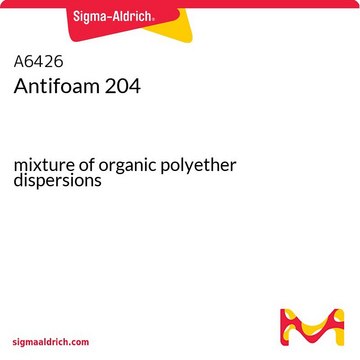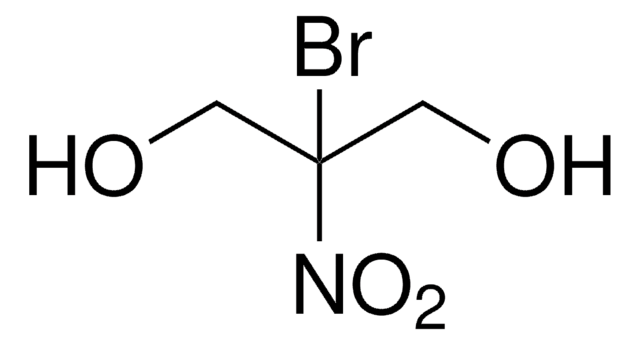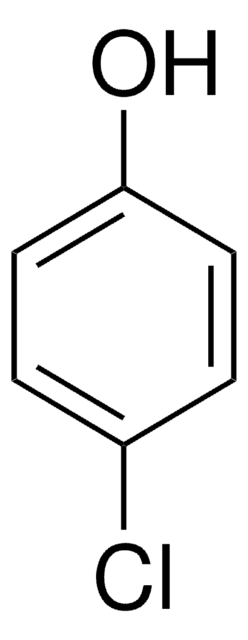112054
1,1,1-Trichloro-2-methyl-2-propanol hemihydrate
98%
Sinónimos:
β,β,β-Trichloro-t-butanol, β,β,β-Trichloro-tert-butyl alcohol hemihydrate, Acetone chloroform, Chloretone, Chlorobutanol
Iniciar sesiónpara Ver la Fijación de precios por contrato y de la organización
About This Item
Fórmula lineal:
Cl3CC(CH3)2OH · 0.5H2O
Número de CAS:
Peso molecular:
186.46
Beilstein:
878167
Número CE:
Número MDL:
Código UNSPSC:
12352100
ID de la sustancia en PubChem:
NACRES:
NA.22
Productos recomendados
Nivel de calidad
Ensayo
98%
Formulario
solid
mp
77-79 °C (lit.)
grupo funcional
chloro
cadena SMILES
O.CC(C)(O)C(Cl)(Cl)Cl
InChI
1S/2C4H7Cl3O.H2O/c2*1-3(2,8)4(5,6)7;/h2*8H,1-2H3;1H2
Clave InChI
WRWLCXJYIMRJIN-UHFFFAOYSA-N
Categorías relacionadas
Descripción general
1,1,1-Trichloro-2-methyl-2-propanol hemihydrate (chlorobutanol) converts benzisoxazole to α-aryloxyisobutyric acid. 1,1,1-Trichloro-2-methyl-2-propanol hemihydrate (chlorobutanol) forms eutectic with dimethyl sulfone, which is the most suitable media for freeze-drying due to its high solubilizing ability and a good rate of solvent removal.
Aplicación
1,1,1-Trichloro-2-methyl-2-propanol (chlorobutanol) is a preservative that can be quantified using capillary electrophoretic method.
Palabra de señalización
Warning
Frases de peligro
Consejos de prudencia
Clasificaciones de peligro
Acute Tox. 4 Oral
Código de clase de almacenamiento
11 - Combustible Solids
Clase de riesgo para el agua (WGK)
WGK 3
Punto de inflamabilidad (°F)
212.0 °F - closed cup
Punto de inflamabilidad (°C)
100 °C - closed cup
Equipo de protección personal
dust mask type N95 (US), Eyeshields, Gloves
Elija entre una de las versiones más recientes:
¿Ya tiene este producto?
Encuentre la documentación para los productos que ha comprado recientemente en la Biblioteca de documentos.
Los clientes también vieron
Antoni Ivorra
PloS one, 6(8), e23456-e23456 (2011-08-19)
Miniaturization of active implantable medical devices is currently compromised by the available means for electrically powering them. Most common energy supply techniques for implants--batteries and inductive couplers--comprise bulky parts which, in most cases, are significantly larger than the circuitry they
Raymond J Cvetovich et al.
The Journal of organic chemistry, 70(21), 8560-8563 (2005-10-08)
A practical synthesis of benzisoxazole 1 and its conversion to alpha-aryloxyisobutyric acid 2 using 1,1,1-trichloro-2-methyl-2-propanol (chloretone) was developed. Benzisoxazole 1 was formed in high yields by the action of either methanesulfonyl chloride/base upon intermediate oxime 8 or with thionyl chloride/base
Jared Talbot et al.
The Journal of experimental biology, 214(Pt 7), 1063-1067 (2011-03-11)
Changes in animal behavior resulting from genetic or chemical intervention are frequently used for phenotype characterizations. The majority of these studies are qualitative in nature, especially in systems that go beyond the classical model organisms. Here, we introduce a quantitative
M S Tesconi et al.
Journal of pharmaceutical sciences, 88(5), 501-506 (1999-05-07)
This study investigates the use of solid, organic compounds to lyophilize drugs without conventional freeze-drying equipment. The aim of the investigation is to find a pharmaceutically acceptable solvent or solvent combination that is appropriate for freeze-drying on the basis of
Małgorzata Jaworska et al.
Journal of separation science, 28(2), 137-143 (2005-03-10)
Preservatives are used to protect pharmaceutical formulations from microbial attack during the period of administration to the patient. Because of their biological activity, preservatives have to be identified and assayed according to the same rules as apply to active components.
Nuestro equipo de científicos tiene experiencia en todas las áreas de investigación: Ciencias de la vida, Ciencia de los materiales, Síntesis química, Cromatografía, Analítica y muchas otras.
Póngase en contacto con el Servicio técnico












